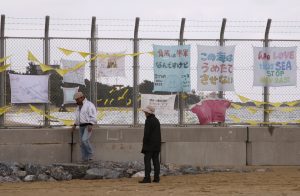Japan’s Defense Minister Taro Kono recently announced the cancellation of the Aegis Ashore land-based missile program.
Prime Minister Shinzo Abe had previously been adamant about the necessity of the program, but Kono announced on June 16 that it was “not rational given the cost and time” required for its preparation. The program has been strongly opposed by the local residents of Akita and Yamaguchi prefectures, respectively, where it would have been operated.
“We’ve been troubling the local people, so I have to apologize to them,” said Kono.
Meanwhile, Japan continues to push forward with the construction of a U.S. base at Henoko, Okinawa despite strong resistance from Okinawans for the past two decades — including a referendum held last year in which over 70 percent voted against the base, while another 9 percent voted undecided.
Japan’s canceling of the missile programs in Akita and Yamaguchi prefectures, while continuing with the construction of the base in Okinawa, is being seen as a clear demonstration of prejudice and discrimination by Okinawans as well as international human rights watchers.
Governor of Okinawa prefecture Denny Tamaki, who was elected on the basis of opposing the base, tweeted, “Kono’s comments on the disbanding of the Aegis Ashore deployment program included budget, time to completion, technical issues regarding the project, and risk elimination. For these same reasons, the U.S. military cannot fulfill its original intention to move Futenma Air Base to Henoko.”
The cost of the Aegis Ashore program is around $1.7 billion, while the cost of the base at Henoko is over $8.5. billion. The base at Henoko has long been criticized as “unworkable” due to it being located over a major earthquake fault line, as well as the “mayonnaise-like” sea floor on which the base is supposed to be built.
History provides context for Japan’s discriminatory actions toward Okinawans. Okinawa was historically an independent country known as Ryukyu. In 1609 the Satsuma clan of Japan invaded, forced Ryukyuans to pay tribute, and executed any who opposed. Nevertheless, Ryukyu maintained its sovereignty and continued to thrive as an independent country until 1879 when Japan again invaded, and this time forcibly annexed Ryukyu, just as it did to much of the rest of East and Southeast Asia over the next 70 years. After World War II, Japan’s other colonial possessions were given back their independence, but the United States military decided to keep Ryukyu for itself to use for bases. Facing strong resistance from Ryukyuans, the U.S. “gave” Ryukyu to Japan in 1972 without a vote from Ryukyuans, and since then Ryukyu has remained under dual U.S.-Japan occupation.
Ryukyuans have been recognized by UNESCO and international human rights organizations as an indigenous people group distinct from Japanese. The United Nations Human Rights Committee (CCPR), the Committee on the Elimination of Racial Discrimination (CERD), and other international human rights organizations have repeatedly chastised Japan for discrimination and human rights abuses toward Ryukyuans and have directed Japan to change its behaviors. Japan, though, has constantly ignored these calls.
Long-time Okinawan politician Iha Youichi tweeted a summary of the current mood:
Okinawa Prefecture’s residents have resisted the construction of the new Henoko base for 23 years, and it will take the [Japanese] government another 12 years or more to construct. In 1996 it was promised that Futenma Air Base would be fully returned to Okinawa within 5-7 years, but it will have been left unreturned for nearly 40 years [according to the current schedule]. The people near Kadena Air Base are constantly harmed by noise pollution, low-altitude military flights are endless near Iejima Airfield and the central and northern flight ranges. Many military accidents and crashes constantly occur in Okinawa. This is discrimination against Okinawans.
Okinawa makes up less than 1 percent of Japan’s land area though contains over 70 percent of Japan’s military presence.
In that context, Okinawans can’t help but wonder why the Japanese government acceded to the demands of residents of Akita and Yamaguchi prefectures – even feeling the need to “apologize” for “troubling” them – all while consistently turning a deaf ear to Okinawan protests.
Robert Kajiwara, Ph.D. A.B.D. Manchester Metropolitan University, is founder and president of the Peace For Okinawa Coalition.

































